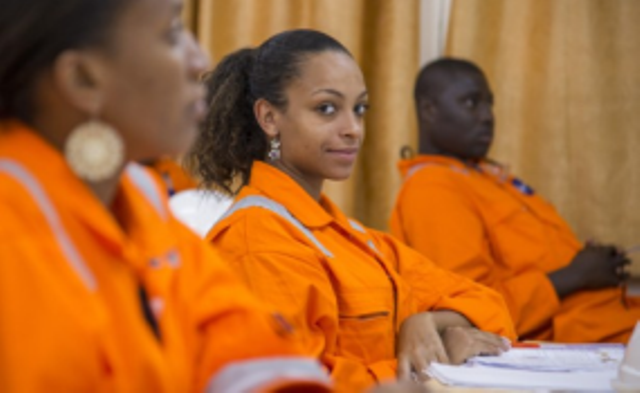África/Septiembre 2016/Noticias/ http://allafrica.com/
Resumen:
El Programa de Formación de Postgrado de Ingeniería, está abierta a hombres y mujeres por igual. Sin embargo. Los cargos de mujeres han dismunuidos , se converso con con dos mujeres y ver su experiencia : Ellas ven la oportunidad de aplicar sus conocimientos técnicos en su país de origen, donde el gas es un sector significativo.Tambien señalan que: «El programa ha sido una gran oportunidad para aumentar mis conocimientos técnicos y de establecer contactos con diversos líderes de negocios. Definitivamente ha sido un reto, pero he utilizado estos desafíos como una oportunidad para aprender y crecer, » En este sentido finalizan con la experiencia y la convicción de estar aportando a su país desde su genero asi como aumentar la participación de mujeres en la ingeniera.
Fuente:
http://allafrica.com/stories/201609081071.html
Fuente imagen:
https://lh3.googleusercontent.com/dkIa-r7bDjDUuQ7VyGgzXpn4IrmUZhAMepm5-OovB_jVTvRodPRSYaUFapNaP7B_LRUp=s138
GE’s Graduate Engineering Training Programme Is Giving Women The Opportunity To Excel
GE’s offer of best-in-class training for young engineers, known as the Graduate Engineering Training Programme, is open to women and men alike. However, women in technical positions the world over are frequently in the minority. We recently caught up with two female participants to chat about their experience and to hear their take on women involvement in the sector.
Claudia Giurriuta, 31, is from Mozambique and has an interest in subsea drilling. She sees an opportunity to apply her technical knowledge in her home country, where gas is a significant sector.
“My father is an auto electrician. When I was a child, I used to see my father working at home on weekends and I used to ask questions and spend my time with him. So I realised that I liked what he was doing because it involves technology. It’s not just about using tools. There was more to what he was doing, so my passion for engineering started then,” she says.
She’s one of only two women in the programme. “At the university, we were only two girls in the class with about 30 boys and I got used to the situation. Even as a woman, I have knowledge and the ability to face any professional situation the same way men do,” she says.
Giurriuta faced significant opposition in her career choice. “My father didn’t agree about my choice to be an engineer. He said engineering is not for women and my mother wanted me to be a lawyer. So I had to lie for one year that I was studying to be a lawyer. When I told them I was studying engineering, they didn’t support me at first, so I explained to them that it’s what I want to do professionally and it’s what I’m happy doing. Nowadays, they are proud of me. I am the only woman engineer in my family.”
Marian Muthui, 26, from Nairobi, Kenya, was attracted to engineering because she believes it is a field that has the greatest potential for social impact as it seeks to solve the world’s most “pressing issues”.
“From a young age, I loved science-based subjects and would often tinker with everything I could get my hands on. I would take things apart and put them back together just to try to understand their intricacies and how they worked,” she says.
When she has completed the GETP, Muthui would like to focus on the energy field as she believes there is a proven correlation between energy security and economic development. “My future interests are in research and development of various microgeneration technologies in renewable power and transportation,” she says.
Muthui has a mechanical engineering degree and joined the GETP when it was still being conceptualised. She says she expected to be in the minority. “Sadly, this is not a strange phenomenon. It has been this way since my days in university and it still persists now in the job market. But, I am optimistic that this will change as the number of women in engineering increases,” she says.
“The programme has been a great opportunity to increase my technical skills and to network with various business leaders. It has definitely been challenging, but I have used those challenges as an opportunity to learn and grow,” she says.
Luckily, Muthui has always had the support of her family to rely on. “Despite the fact that we did not know a single engineer, we educated ourselves on the topic and saw it as a perfect fit for me in accomplishing my future goals,” she says.
To encourage more girls and young women to study science and engineering, Muthui says exposure is the key factor. “Most young women do not know what exactly engineers do and some believe that it is a field just for men. In my downtime, I hold workshops with young high-school girls to mentor and encourage them to pursue careers in science, technology, engineering and mathematics. This is my personal contribution to increasing the number of women in engineering,” she says.







 Users Today : 34
Users Today : 34 Total Users : 35460243
Total Users : 35460243 Views Today : 42
Views Today : 42 Total views : 3418937
Total views : 3418937